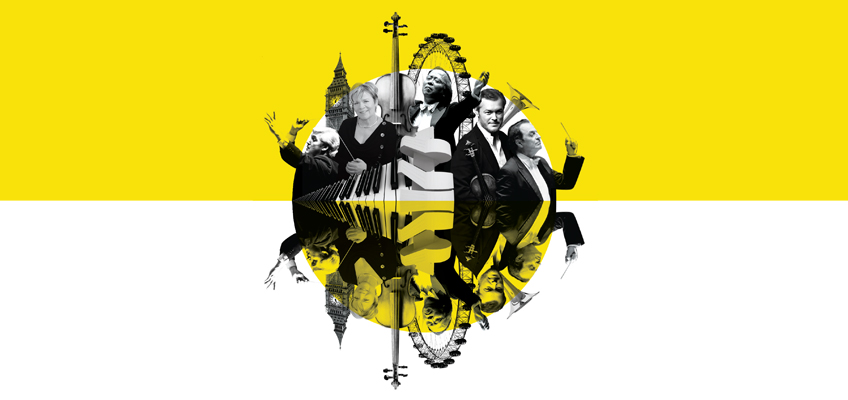Six brilliant conductors, ten sparkling soloists, sixteen amazing works, and one legendary orchestra. That, in bald numbers, is the Royal Philharmonic Orchestra's Southbank Centre concert season at the Royal Festival Hall, starting on Tuesday 7 February. However, in the sheer quality of the Orchestra's playing and the music it will be performing, such calculations convey little about the music in store for seasoned concertgoers and classical discoverers alike.
Instead, some names: Charles Dutoit, of course – the RPO's Artistic Director and Principal Conductor. He'll be conducting not one but two concerts that will include those great warhorses of the classical repertoire: Grieg's Piano Concerto, performed by Elisabeth Leonskaja (7 March), and Prokofiev's Violin Concerto No.2, with soloist Vadim Repin (19 April).
In fact, the great concertos will, for the most part, provide the backbone of the new season's exciting programming: Grieg and Prokofiev just mentioned of course, but also the Mendelssohn Violin Concerto performed by Renaud Capuçon and conducted by Marin Alsop (27 February), and Tchaikovsky's Piano Concerto No.2 performed by John Lill and conducted by Tadaaki Otaka (6 June).
Also, kicking off the new season, Beethoven's sublime Violin Concerto performed in a concert exclusively of works by the great master, and performed and conducted by Pinchas Zukerman (7 February).
Let's linger a moment over this extraordinary season-opener. Not only Beethoven's Violin Concerto but also the composer's Egmont Overture and, separating these two giants of the repertoire, a third: his Symphony No.7, made more famous still by its inclusion in the soundtrack of the film, The King's Speech.
From one musical colossus to three. The RPO's concert on 27 February displays conductor Marin Alsop's flair for varied and compelling programming, opening with Copland's Fanfare for the Common Man, passing through Mendelssohn's Violin Concerto and concluding with Shostakovich's soulful Symphony No.7 (Leningrad). This is the American conductor's first experience at the helm of the RPO and on the strength of this programme alone, the RPO audience should be in no doubt about Alsop's mastery of the repertoire and her ability to create lasting, musical memories.
A gift Alsop shares with Charles Dutoit who, the following month (7 March), takes charge of the RPO in a concert crowned by Grieg's Piano Concerto but notable also for the inclusion of Berlioz Benvenuto Cellini Overture (Dutoit is a noted exponent of the composer's music) and, to close, Prokofiev's Symphony No.5 with its message of hope over despair, composed in the summer of 1944 when humanity's future was balanced on a knife edge.
Three concertos and three symphonies – and we're only in March. Time, then, to take stock with, in April, a concert given over entirely to Verdi's Requiem, a towering work that is by turns spine-tinglingly dramatic and profoundly serene, with a welcome RPO return at the helm from Vasily Petrenko. Conductor and orchestra accompany the legendary Bach Choir and soloists in what is sure to be a memorable mid-point in the RPO's mouth-watering Southbank Centre season.
Follow that! Sure enough, on 19 April the RPO does just that. With Charles Dutoit at the helm once again, the Orchestra performs Ravel's enchanting Mother Goose Suite, inspired by childhood. In an inspired piece of programming, it's followed by Prokofiev's Violin Concerto No.2, a work that seems almost to spring from the Ravel, fully formed. And then it's back to an entirely different soundworld in the shape of Dvořák's 'New World' Symphony. As Ravel so magically recalls a lost age, so Dvořák brilliant evokes a lost country, his native Bohemia, to which he would eventually return.
An exquisite selection of works rounds out the RPO's Royal Festival Hall season when, on 6 June, Tadaaki Otaka conducts the Orchestra in music by Elgar, Tchaikovsky and Walton. Elgar's Die Meistersinger-inspired Froissart Overture; an intensely dramatic work suffused with delicious, Elgarian touches, opens the evening. It's followed by Tchaikovsky's Piano Concerto No.2; not No.1, the old warhorse, but its lighter, more exuberant follow-up composed around the same time. Then to close the evening: Walton's mercurial Symphony No.1, with its hauntingly beautiful Andante third movement that will make the hairs stand on the back of your neck.
That's if they aren't already standing to attention in the wake of such an outpouring of stunning music-making, performed across six concerts over the course of four months by one great ensemble: the Royal Philharmonic Orchestra. Surely, the only numbers worth hearing.
Written by John Evans
Upcoming performances in the RPO's Royal Festival Hall series:
- Pinchas Zukerman performs Beethoven, Tuesday 7 February. Find out more...
- Marin Alsop conducts Shostakovich, Monday 27 February. Find out more...
- Charles Dutoit conducts Grieg and Prokofiev, Tuesday 7 March. Find out more...
- Vasily Petrenko conducts Verdi's Requiem, Thursday 13 April. Find out more...
- Vadim Repin performs Prokofiev, Wednesday 19 April. Find out more...
- Tadaaki Otaka conducts Walton, Tuesday 6 June. Find out more...

